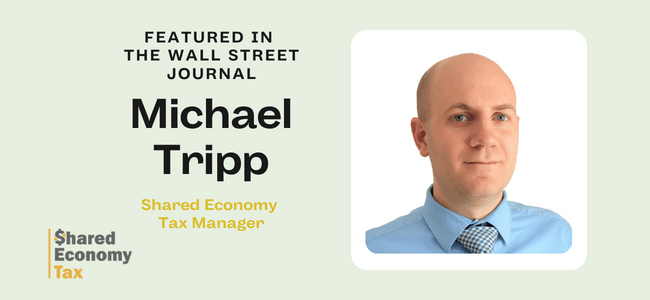Summer is a time when many teens and students seek a part-time or full-time temporary job. The shared economy is full of opportunities, some of which even allow them to work from home. The shared economy, sometimes called the “gig” economy, is a lucrative opportunity. However, it’s important to know about a few changes in how the IRS treats the shared economy before you dive in. Shared Economy Tax Tax Manager, Michael Tripp, was recently quoted in the Wall Street Journal (WSJ) and has some insights into this topic.
Shared Economy Tax Senior Associate Michael Tripp
Michael Tripp is an experienced tax professional with over a decade of experience. His specialty is helping small business owners, partnerships, and S-corporations. In addition, he represents industries that include tech companies, real estate, and online businesses. Tripp has earned the right to represent clients in IRS-related issues and knows the nuances of small business tax concerns.
As a Shared Economy agent, Mr. Tripp enjoys helping entrepreneurs and small businesses of many kinds with tax and business management issues. When he is not assisting companies in resolving their tax issues, he enjoys many activities outside of work. Mr. Tripp enjoys spending time with his daughter and mountain biking. With his experience, it is not surprising that the Wall Street Journal reached out for his expertise in a recent article on tax changes that affect those in the shared economy.
Michael Tripp WSJ Quote
The Wall Street Journal recently quoted Michael Tripp in an article they wrote. The article explores tax code changes that affect teens seeking temporary summer employment in the shared economy. In the past, many students who took summer jobs did not have to pay taxes. In other words, they did not meet certain income thresholds and were not responsible for paying those taxes. However, the rules have changed.
Under the old rules, they still had to pay social security and Medicare taxes. However, these workers could often keep everything after that without owing additional taxes. Whether a teen working a summer job owes taxes depends on their classification for tax status. For example, taxes are different if someone works as a full-time temporary employee, someone who is self-employed, or a person who is working in the gig economy or as a contractor.
First, one of the fundamental changes for 2022 is that the IRS has eliminated income tax arrears on employee wages and net income for the self-employed up to $12,950. Secondly, the new income tax rate begins at 10%, rather than 15.3%, as it did in the past. In the article, Tripp explains how certain tax deductions can be combined for even more significant savings when settling with the IRS.
Likewise, these tips help family businesses, as they can deduct the child’s salary as a business expense. The savings can add up quickly for those with a more significant gap between the tax rate for business revenues and the child’s tax rate. However, this advice is only one of the ways how teens can take advantage of changes in the tax code to help keep more cash in their pocket.
Michael Tripp’s Wall Street Journal article gives some good advice for part-time workers.
Congratulations, Mike!
Congratulations, Michael Tripp, on your feature in the WSJ. You gave excellent advice. We are proud of you!
If you have more tax questions, talk to the pros at Shared Economy Tax. We can help solve your toughest challenges, including navigating the tax laws as they pertain to the shared economy. Contact us today for a complimentary one-on-one strategy session! You have nothing to lose!

